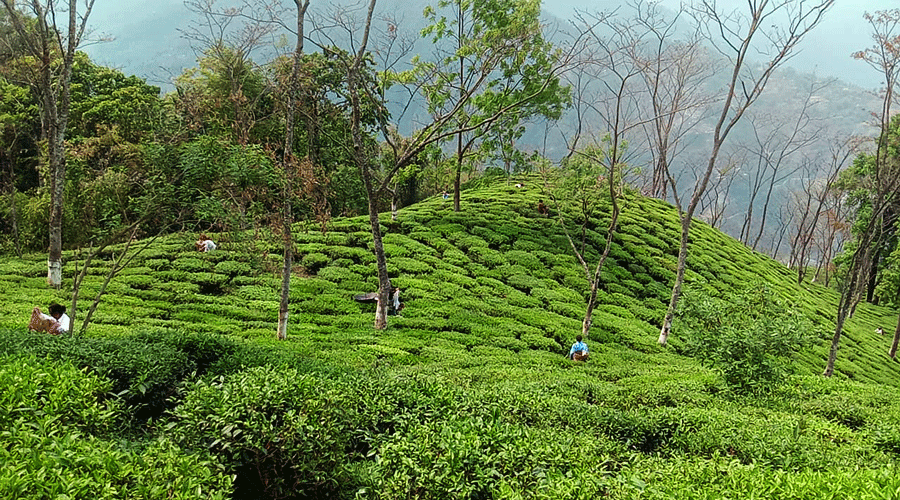
Darjeeling tea planters seek tough measures
In order to address this prevailing grave situation we are working on several issues, says principal advisor, DTA
 |
| A tea garden in Darjeeling hills.File picture |
Vivek Chhetri | TT | Darjeeling | 19.02.23 : The Darjeeling tea industry has prepared a blueprint that for the first time includes reducing the number of sub-staffs and increasing the plucking task of workers in an effort to tide over an “unprecedented crisis” in the nearly 170-year-old sector.
Darjeeling planters maintain that the world-famous industry is grossly handicapped by the lack of workers resulting in low productivity, an “unproductive sub-staff category” and drop in export demand and the impact of Nepal tea.
“In order to address this prevailing grave situation we are working on several issues,” said Sandeep Mukherjee, principal advisor, Darjeeling Tea Association (DTA).
The planters’ association wants the sub-staff category to be reduced. The sub-staffs are generally supervisors whose salaries range from Rs 7,500 to Rs 25,000.
According to industry practice, a supervisor is appointed for every 18 workers.
The Darjeeling tea industry employs around 55,000 permanent staff and 15,000 temporary workers.
“The sub-staff category in tea gardens, which is largely unproductive, needs to be reduced. We are not looking at terminating their services immediately but we do not want to fill up any vacant posts because of retirement,” said Mukherjee.
The decision has also been influenced by high absenteeism among workers. “The absenteeism rate is as high as 45 percent,” said Mukherjee.
While planters maintain that the new generation no longer wants to work as tea leaf pluckers, tea workers’ unions maintain that a daily wage of Rs 232 also contributes to high absenteeism.
Fewer workers mean less productivity, as the entire lot of tea leaves in a garden can’t be plucked at the right time, said planters.
“From an annual production of 14 million kg of made tea in the 1980s, production fell to 6.75 million kg of made tea in 2022,” said Mukherjee.
Apart from absenteeism, a section has also blamed old tea bushes for low productivity. The planters also want to increase the plucking task of workers.
At the moment, a worker has to pluck at least 7-8kg a day to earn his wages. The management pays an additional incentive ranging from Rs 12 to Rs 15 per kg of leaves plucked.
“We are looking at increasing the minimum plucking task to around 10 to 11kg per worker,” said Mukherjee.
Planters maintain that while that production cost of a kg of Darjeeling tea ranges from Rs 850 to Rs 1,000, the “average auction” price realisation is presently between Rs 250 to Rs 300.
Many, however, maintain that the industry makes a good profit through exports whose prices are not revealed by tea groups.
The DTA, however, countered the argument. “Of the 6.75 million kg of tea, less than 3 million kg of tea was exported. Due to the ongoing Russian-Ukraine war, the demand for tea has further gone down,” said Mukherjee.
The industry also wants to strictly implement the eighthour working hours rule.
J.B. Tamang, working president of the tea union affiliated to Bharatiya Gorkha Prajatantrik Morchad (BGPM), which is the largest party in the hills, said that they would not accept these suggestions.
“The issue has not been discussed with us. However, the old practice must continue in the gardens,” said Tamang.
New management
Four tea gardens in Darjeeling have been taken over by respective new management after a meeting was facilitated by the state labour department in Siliguri on Friday.
The Siliguri-based Royal Ruby Tea & Agro Company has taken over the management of Pandam and Rungmook Cedar tea gardens.
Calcutta-based BD Tea Estate (Chamong Group) has taken over Rangaroon. Aloobari, the oldest tea garden of the industry has been taken over by Calcutta-based Green Leaf Venture.

0 Response to " Darjeeling tea planters seek tough measures"
Post a Comment
Disclaimer Note:
The views expressed in the articles published here are solely those of the author and do not necessarily reflect the official policy, position, or perspective of Kalimpong News or KalimNews. Kalimpong News and KalimNews disclaim all liability for the published or posted articles, news, and information and assume no responsibility for the accuracy or validity of the content.
Kalimpong News is a non-profit online news platform managed by KalimNews and operated under the Kalimpong Press Club.
Comment Policy:
We encourage respectful and constructive discussions. Please ensure decency while commenting and register with your email ID to participate.
Note: only a member of this blog may post a comment.